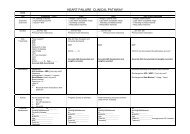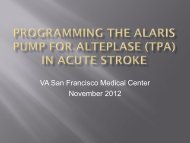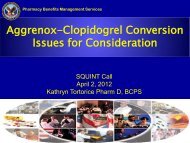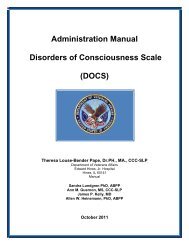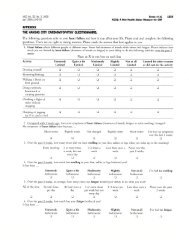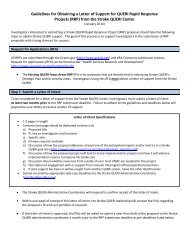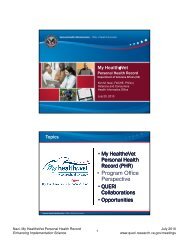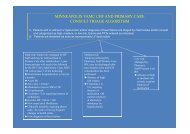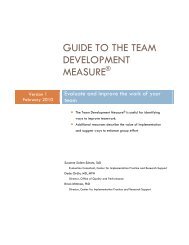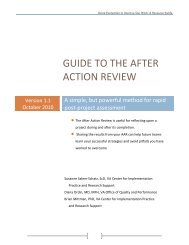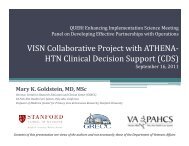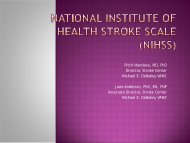The Veteran Supported Education Service Treatment Manual: VetSEd
The Veteran Supported Education Service Treatment Manual: VetSEd
The Veteran Supported Education Service Treatment Manual: VetSEd
You also want an ePaper? Increase the reach of your titles
YUMPU automatically turns print PDFs into web optimized ePapers that Google loves.
Social Skills Training (SST)<br />
SST was initially developed in the 1970‘s for individuals who needed help with<br />
community integration, relationship development, and comfort in social situations.<br />
(Bellack, 2004; Mueser & Bellack, 2007). Based on social learning principles, SST is not<br />
discussion-based—rather, it focuses on practicing behavior. SST involves teaching<br />
clients essential interpersonal skills by breaking complex behaviors down into simpler,<br />
easier to understand components (Bellack, 2004; Mueser & Bellack, 2007). As a <strong>VetSEd</strong><br />
provider, work with your <strong>Veteran</strong>s and teach them how to perform these simpler steps<br />
through role-plays and, once the <strong>Veteran</strong> has mastered these simpler tasks, combine them<br />
so that the <strong>Veteran</strong> can perform the desired, more complex behavior. SST can play an<br />
important role in the day-to-day functioning of <strong>Veteran</strong>s in recovery from mental illness,<br />
substance abuse, and COD, especially as they engage in new experiences such as school.<br />
Mutual Support 12-Step Groups<br />
As you work with <strong>Veteran</strong>s in <strong>VetSEd</strong> who are diagnosed with mental illness, substance<br />
abuse, or COD, you might want to become acquainted with the philosophy and practice<br />
of mutual support 12-step groups, if you are not already. Twelve-step groups are<br />
fellowships of men and women who share perspectives on the negative consequences of<br />
addictions. Twelve-step groups such as Alcoholics Anonymous (AA), Narcotics<br />
Anonymous (NA) and other Twelve-Step recovery programs (Gamblers Anonymous and<br />
Nicotine Anonymous), constitute an evidence-based practice that has been an essential<br />
component in recovery from substance use and other addictions for over fifty years.<br />
Participants in the program help one another navigate the recovery process by providing<br />
both a trusted roadmap and a companion—a sponsor. Participation is free of charge, and<br />
the only criterion for membership is a commitment to stop a specific addictive behavior.<br />
Different types of twelve-step groups (e.g., open meetings, step meetings, women-only<br />
meetings) are held in cities and towns across the United States.<br />
For more information about NA/AA and other 12-step groups please visit: Alcoholics<br />
Anonymous http://www.aa.org/ and Narcotics Anonymous http://www.na.org/.<br />
108 | P a g e



